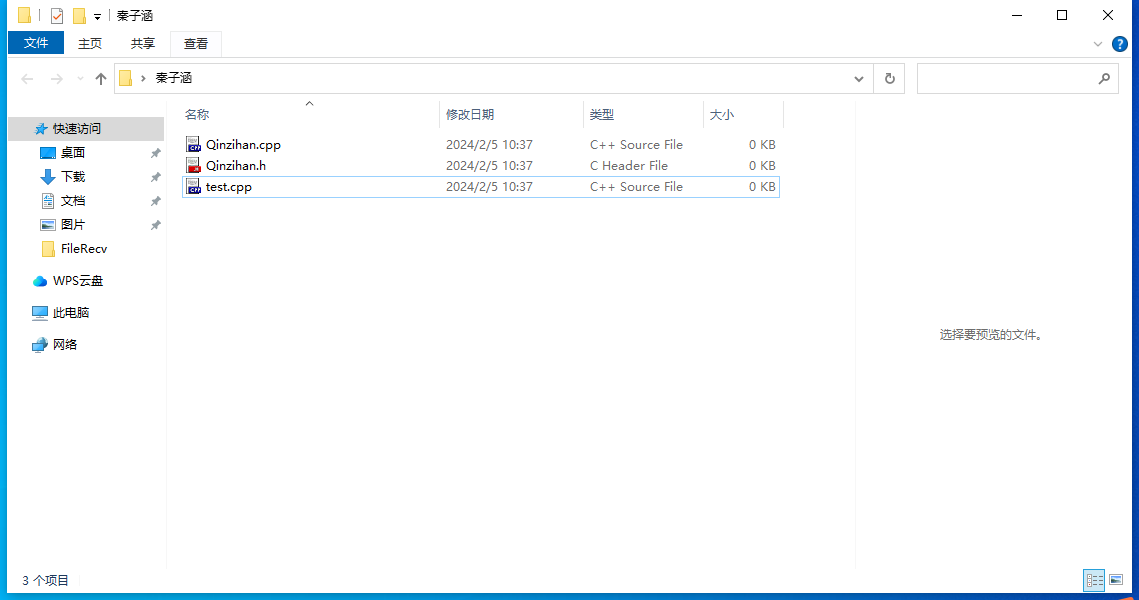关于头文件的使用
关于头文件的使用
这里写一下这个东西,毕竟我在使用的时候还是有不少的疑问
一、头文件
头文件就是在写 C++ 代码的时候,在最开头几行引用的文件,这里比如说:
# include <iostream>
我们就是引用了一个名称为
iostream
的头文件
这里这个文件为什么没有后缀名呢,这我就不是很清楚了,据说是取巧,或者是为了统一 C++ 头文件的格式
这里我把
iostream
的文件放在这里:
// Standard iostream objects -*- C++ -*-
// Copyright (C) 1997-2014 Free Software Foundation, Inc.
//
// This file is part of the GNU ISO C++ Library. This library is free
// software; you can redistribute it and/or modify it under the
// terms of the GNU General Public License as published by the
// Free Software Foundation; either version 3, or (at your option)
// any later version.
// This library is distributed in the hope that it will be useful,
// but WITHOUT ANY WARRANTY; without even the implied warranty of
// MERCHANTABILITY or FITNESS FOR A PARTICULAR PURPOSE. See the
// GNU General Public License for more details.
// Under Section 7 of GPL version 3, you are granted additional
// permissions described in the GCC Runtime Library Exception, version
// 3.1, as published by the Free Software Foundation.
// You should have received a copy of the GNU General Public License and
// a copy of the GCC Runtime Library Exception along with this program;
// see the files COPYING3 and COPYING.RUNTIME respectively. If not, see
// <http://www.gnu.org/licenses/>.
/** @file include/iostream
* This is a Standard C++ Library header.
*/
//
// ISO C++ 14882: 27.3 Standard iostream objects
//
#ifndef _GLIBCXX_IOSTREAM
#define _GLIBCXX_IOSTREAM 1
#pragma GCC system_header
#include <bits/c++config.h>
#include <ostream>
#include <istream>
namespace std _GLIBCXX_VISIBILITY(default)
{
_GLIBCXX_BEGIN_NAMESPACE_VERSION
/**
* @name Standard Stream Objects
*
* The <iostream> header declares the eight <em>standard stream
* objects</em>. For other declarations, see
* http://gcc.gnu.org/onlinedocs/libstdc++/manual/io.html
* and the @link iosfwd I/O forward declarations @endlink
*
* They are required by default to cooperate with the global C
* library's @c FILE streams, and to be available during program
* startup and termination. For more information, see the section of the
* manual linked to above.
*/
//@{
extern istream cin; /// Linked to standard input
extern ostream cout; /// Linked to standard output
extern ostream cerr; /// Linked to standard error (unbuffered)
extern ostream clog; /// Linked to standard error (buffered)
#ifdef _GLIBCXX_USE_WCHAR_T
extern wistream wcin; /// Linked to standard input
extern wostream wcout; /// Linked to standard output
extern wostream wcerr; /// Linked to standard error (unbuffered)
extern wostream wclog; /// Linked to standard error (buffered)
#endif
//@}
// For construction of filebuffers for cout, cin, cerr, clog et. al.
static ios_base::Init __ioinit;
_GLIBCXX_END_NAMESPACE_VERSION
} // namespace
#endif /* _GLIBCXX_IOSTREAM */
你会发现,我们在这个头文件中定义了一些东西,所以我们在引用这个头文件的时候就可以用这些定义过的东西
但是说的再准确一点,这又不叫定义,而是叫做声明
具体一点说,我们先看一下头文件的格式:
# ifndef _NAME_H_
# define _NAME_H_
// 在这里定义一些东西
# endif
这里我们的第一行的
_NAME_H_
是你自己起的名字,但是最好和头文件的名字一样
保存,后缀名
.h
然后中间定义的格式是这样的:
# include <bits/stdc++.h> // 引用你需要的头文件,可以是自定义的
using namespace std;
inline void Afunction () ;
class A {
public :
inline void init () ;
} ;
这就是头文件,而具体函数的定义,我们放在源文件里
二、源文件
源文件的后缀名是
.cpp
,用于写
C++
代码,这里我们把一组头文件和源文件配对,名称的话最好是一样的
然后我们在源文件里引用头文件,在源文件里面定义头文件中声明而没有定义的函数即可
具体格式见下:
# include <bits/stdc++.h>
# include "..." // 你的头文件的地址
using namespace std;
void Afuncion () {
return ;
}
void A :: init () {
if (1 + 1 == 2) return ;
}
三、实战
为了让大家更透彻的理解,我们写一个有关秦子涵的文件
首先,我们这样拜访我们的文件:

然后我们在
Qinzihan.h
里面这样写:
# ifndef _QINZIHAN_H_
# define _QINZIHAN_H_
# include <bits/stdc++.h>
using namespace std;
class Qinzihan {
public :
long long Weight = 2147483647; // 体重
bool Dead = false; // 解脱了没
void Init (long long w) ; // 初始化/创造一个秦子涵
void Eat (long long food) ; // 本能:吃东西
} ;
Qinzihan ReadQinzihan () ; // 读入一个秦子涵
# endif
然后我们在
Qinzihan.cpp
里写这些:
# include <bits/stdc++.h>
# include "Qinzihan.h" // 引用我们的头文件
using namespace std;
// 把声明的函数定义一下
void Qinzihan :: Init (long long w) {
this -> Weight = w * 10; // 初始天赋,10 倍体重
}
void Qinzihan :: Eat (long long food) {
if (this -> Dead) return ;
this -> Weight += food;
if (this -> Weight < 0) Dead = true;
}
Qinzihan ReadQinzihan () {
long long w = scanf ("%lld", &w);
Qinzihan nw = init (w);
return Qinzihan;
}
// 若是不运行这个程序,就不用写 main 函数
接下来我们在新文件
test.cpp
里试试:
# include <bits/stdc++.h>
# include "Qinzihan.h"
using namespace std;
signed main () {
Qinzihan qinzh = ReadQinzihan ();
while (! qinzh.Dead) qinzh.Eat (100000);
return 0;
}
四、结语
这里提前祝大家龙年大吉啦